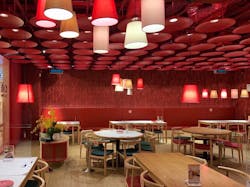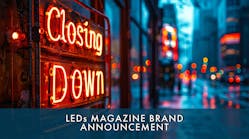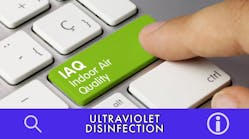Taiwan restaurants, Munich schools — Is UV-C finally taking off for Signify?
The latest sign that Signify’s sales of UV-C disinfection products could be accelerating comes from Taiwan, where restaurant operator TTFB has deployed luminaires across 34 sites, with 100 more possibly to follow. In the home market, Signify has widened the territories for its UV-C box and added a portable air cleaner.
As LEDs Magazine reported recently, the Taiwanese deployment marks at least the second example of wider-scale UV-C installations, which until now have had a onesie-twosie nature for Signify and its Philips brand. It follows the company’s announcement that Munich schools are wheeling out 7,500 mobile UV-C air cleaners aimed at deactivating the SARS-CoV-2 virus, which causes COVID-19.
Ultraviolet C-band radiation is shorter wavelength than A and B bands and has been proven to kill SARS-CoV-2 at certain dosages.
It is possible that Signify has deployed more UV-C technology than it has announced, including large installations. In fact, the company did not announce the Taiwanese sale in the conventional manner of issuing a press release. Rather, CEO Eric Rondolat revealed the TTFB deployment during a web call with analysts last month to discuss the company’s fourth-quarter and year-end financial results.
Rondolat himself has more than once over the last year hinted that UV-C sales have not had a fast start since the company announced early in the pandemic that it would ramp up a portfolio of 12 families of UV-C products.
In October he told analysts that “it’s a pending assignment on our side to educate the market more,” while also noting that Signify was shifting to a strategy that emphasized making finished UV-C goods over providing UV-C sources to other manufacturers on an OEM basis. Last April, he characterized the UV-C business as “a marathon, not a sprint,” noting the home market was livelier than the commercial space.
The Munich and Taiwanese developments indicated that the pace for UV-C rollouts could now be picking up.
TTFB, based in New Taipei City, operates eight different chains in Taiwan and China. Signify has provided UV-C products for six of them — Very Thai Restaurant, Thai Town Cuisine, 1010 Hunan Cuisine, Shann Rice Bar, YABI Kitchen, and Very Thai Noodles.
The products, in 34 locations, include Signify’s upper-air cleaner in dining areas and battens in kitchens. Both use mercury-vapor UV-C sources, not LED. The upper-air cleaners shield UV-C emissions from people, a necessary safety design given that UV-C is harmful to skin and eyes when they are exposed for certain lengths of time.
The UV-C in the battens comes from an unshielded tube. So how can that be safe?
“The UV-C battens are on between 3 PM and 5 PM, which is the rest break in the afternoon, so there’s no staff in the kitchen, and between 3 to 4 AM, which is after working hours in the middle of the night,” a Signify spokesperson told LEDs. “Additionally, the battens are equipped with a sensor, which will switch off the device when detecting a presence.
Meanwhile, in the consumer market, Rondolat revealed on the web call that Signify is now offering a portable UV-C air cleaner intended for home use. The unit draws in air, which it treats with UV-C radiation. The company is offering it in Holland, Korea, Australia, Indonesia, Thailand, Vietnam, and Japan.
Signify has also expanded availability of an enclosed disinfection box to Latin America. The box, already available in Asia, is designed to disinfect small objects such as keys, phones, and toys.
MARK HALPER is a contributing editor for LEDs Magazine, and an energy, technology, and business journalist ([email protected]).
For up-to-the-minute LED and SSL updates, why not follow us on Twitter? You’ll find curated content and commentary, as well as information on industry events, webcasts, and surveys on our LinkedIn Company Page and our Facebook page.

Mark Halper | Contributing Editor, LEDs Magazine, and Business/Energy/Technology Journalist
Mark Halper is a freelance business, technology, and science journalist who covers everything from media moguls to subatomic particles. Halper has written from locations around the world for TIME Magazine, Fortune, Forbes, the New York Times, the Financial Times, the Guardian, CBS, Wired, and many others. A US citizen living in Britain, he cut his journalism teeth cutting and pasting copy for an English-language daily newspaper in Mexico City. Halper has a BA in history from Cornell University.





![The DesignLights Consortium continues to make progress in shifting outdoor lighting products and implementation practices toward a more restrained and thoughtful strategy. [Image does not represent a DLC qualified fixture.] The DesignLights Consortium continues to make progress in shifting outdoor lighting products and implementation practices toward a more restrained and thoughtful strategy. [Image does not represent a DLC qualified fixture.]](https://img.ledsmagazine.com/files/base/ebm/leds/image/2024/08/66be810888ae93f656446f61-dreamstime_m_265700653.png?auto=format,compress&fit=&q=45&h=139&height=139&w=250&width=250)
